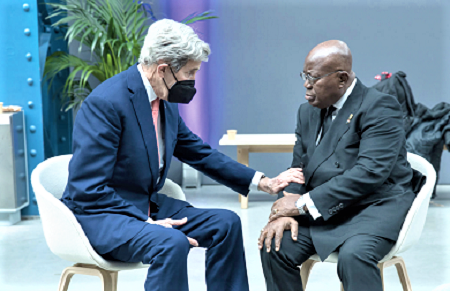
Ghana implements action to curb illegal fishing: As $200m spent annually on fish imports - Akufo-Addo
President Nana Addo Dankwa Akufo-Addo has said Ghana is implementing a National Plan of Action to curb the menace of illegal and unregulated fishing.
He explained that components of the plan included fish catch certification, the reactivation and installation of vessel monitoring systems (VMS), automatic identification system (AIS) on vessels, port and beach inspections and sea patrols.
The President made this known in a speech at the One Ocean Summit in Brest, France.
He was in France at the invitation of the French President, Mr Emmanuel Macron.
Pact
President Akufo-Addo indicated that Ghana and its neighbours, Togo and Benin, had signed a pact to implement a joint fisheries observer programme as part of efforts to ensure that safe, secure and legal fisheries were maintained across the Gulf of Guinea.
"We are completing work on our Ocean Governance Study and putting in place the requisite structures and processes to ensure that we complete our Sustainable Ocean Plan by 2025, as prescribed by the High-Level Panel on the Ocean Economy on 20th December, 2021," he added.
$200 million
He said Ghana had been compelled to spend some $200 million annually to import fish to shore up its fish requirements due to illegal, unregulated and unreported (IUU) fishing activities, which had contributed significantly to the decline in fish stocks in the country.
President Akufo-Addo explained that the health of the planet and the peoples of the world was inextricably linked to the health of the oceans.
Existential threat
“Seventy per cent of the earth’s surface is covered by oceans, which account for the very origins of life, as we know it. The world’s oceans provide food and sustenance, mineral resources, energy, employment and livelihoods, transport and recreation.
“Acting as the lungs of the planet, oceans are responsible for some 50 per cent of the oxygen produced on the planet and absorb 25 per cent of carbon dioxide emissions resulting from human activity,” the President said.
He, however, noted that that God-given asset faced an existential threat, largely from pollution and over-exploitation, saying the world had to take decisive actions now to safeguard the ocean’s capacity to regenerate.
That, he said, would allow it to continue to deliver substantial economic, environmental and social value for human development.
Ratification
The President indicated that at the continental level, the government was in the process of ratifying the 2012 Cape Town Agreement on Fishing Vessel Safety.
“I am expectant that Ghana will shortly deposit its instrument of accession. This will mark a major milestone in our endeavour to build a sustainable blue economy” he said.
Towards addressing the vexed issue of marine litter and plastic pollution, it will be recalled that Ecuador, Germany, Vietnam and Ghana, with support from the UN Environment Programme, successfully convened the Ministerial Conference on Plastic Pollution and Marine Litter in Geneva, Switzerland, last year.
The Ministerial Statement on Global Plastics Agreement, an outcome of the conference, recognised “the need for further commitment and actions across the life cycle of plastics to address marine litter and microplastics, including through a circular economy approach”.
New Plastics Economy
President Akufo-Addo said Ghana shared in the vision of a New Plastics Economy and would sign onto the initiative.
He urged world leaders to commit to a greater course of action to support the attainment of SDG 14, “which demands that we conserve and sustainably use the oceans, seas and marine resources for sustainable development".
“Let us all put our shoulders to the wheel and take up the challenge for the sake of our common humanity,” he added.
